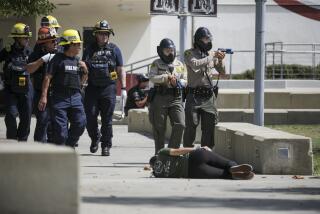Law to Aid Members of Guard
- Share via
SACRAMENTO — California National Guard members returning from Iraq, Afghanistan or other federal duty will get an edge in landing state jobs under a bill Gov. Arnold Schwarzenegger signed Wednesday.
State law already gives veterans “preference points” when they take examinations for state Civil Service jobs. But that advantage did not extend to members of the California National Guard, thousands of whom have been called away from their jobs and families for months and longer to serve on active duty.
Assemblyman Sam Blakeslee (R-San Luis Obispo) wrote AB 2550 to help address the high unemployment rates suffered by California National Guard members returning to California.
The law, which takes effect in January, also awards state job application credits to the widows and spouses of Guard members who have been killed or disabled in their military service.
“Our brave men and women in the military are incredible, and we owe them our deepest gratitude for taking extraordinary risks and making tremendous sacrifices in defense of our country’s freedom and democracy,” Schwarzenegger said in a statement. “This legislation will help our National Guard members continue their career serving others by becoming a California state employee.”
To qualify, a member of the Guard must have served at least 90 days of federal active duty. Since 9/11, at least 21,000 California National Guard members have been deployed, most of them overseas.
The governor also signed a bill Wednesday outlawing the chaining of dogs for more than three hours a day, saying the new law will help prevent dog attacks.
Animal rights groups sponsored the bill, arguing that chained dogs often get inadequate food, water and medical attention and are more likely to bite people, because they are not socialized and cannot flee perceived threats.
The governor’s signature makes California the second state, after Connecticut, to limit dog tethering.
“This bill helps protect dogs from cruelty,” Schwarzenegger said in a statement, “and enhances public safety by preventing aggressive animal behavior that can result from inhumane tethering.”
The governor, whose children have two dogs, signed the bill despite the opposition of policy advisors who called it unnecessary.
SB 1578 by Sen. Alan Lowenthal (D-Long Beach) will take effect in January and make it a misdemeanor punishable by a fine of $1,000 or six months in jail to tie, chain or tether a dog more than three hours a day. The law makes exceptions for dogs herding sheep or cattle, staying in campgrounds or tied to running lines or pulley systems.
About 80 cities or counties in the nation already restrict dog chaining, including the city of Los Angeles, according to the Animal Protection Institute, a national nonprofit group that advocates for humane treatment of animals.
The Los Angeles ordinance, adopted in 2004, is stricter than the new state law. It includes no exception for running lines or pulley systems, said Department of Animal Services General Manager Ed Boks, and allows dogs to be tied up only long enough for people to complete temporary tasks such as mowing the lawn.
“This is a real tool for animal care and control officers,” Boks said. “It’s a real tool too in helping people understand the value of their own pets. A tethered pet typically doesn’t get the love and attention of a household pet.”
The California Animal Assn., the coalition of 15 animal rights groups that sponsored the bill, agreed to an exception in the law for pulley systems and running lines, because some families may not be able to afford to fence a dog, spokeswoman Pam Runquist said.
“This is really a precedent-setting measure,” Runquist said, “in that we are banning [tethering] for other than short periods of times and demonstrating that California really cares about the treatment of our dogs.”
More to Read
Sign up for Essential California
The most important California stories and recommendations in your inbox every morning.
You may occasionally receive promotional content from the Los Angeles Times.













